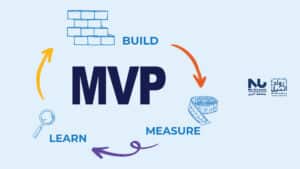In today’s tech-driven landscape, entrepreneurs are on a quest for innovation, aiming to redefine industries and boost efficiency. That is why the game-changing potential of the Internet of Things (IoT) has triggered the interest of business leaders and entrepreneurs from various sectors, with “Business Insider” foreseeing 55 billion interconnected devices by 2025.
IoT steps in as a catalyst, helping organizations ditch old-school manual asset tracking for smart, internet-connected sensors. These sensors seamlessly sync with central systems, enabling real-time monitoring of invaluable company assets. Moreover, IoT isn’t just about operations; it’s a frontier for delivering next-level customer satisfaction through personalized experiences and cutting-edge functionalities.
Examples of entrepreneurs leveraging the potential of IoT to achieve remarkable success within the domain of mobile applications:
- Fitbit Fitness Insights
Fitbit, renowned for its IoT-enabled fitness trackers, has paved the way for entrepreneurs to develop complementary apps. These apps offer comprehensive health and fitness insights, track activities, and deliver personalized recommendations by harnessing the data collected from Fitbit devices. - Fleetio Fleet Management
Fleetio, a cutting-edge fleet management software utilizing IoT, is a prime example. Entrepreneurs can extend the capabilities of Fleetio by crafting apps that integrate seamlessly. These apps may provide additional features, such as fuel efficiency analysis or driver performance monitoring, enhancing overall fleet management. - OpenTable’s Smart Dining Experience
OpenTable, a widely-used restaurant reservation app, has embraced IoT technology. Through it, certain restaurants leverage IoT-enabled systems to monitor table occupancy, wait times, and customer preferences. Entrepreneurs can develop apps that elevate the dining experience, offering personalized recommendations or efficient waitlist management.
These examples showcase how entrepreneurs are leveraging IoT within mobile applications to revolutionize industries, from fitness and fleet management to the hospitality sector. The integration of IoT not only enhances existing services but also opens doors to innovative features, paving the way for a connected and smarter future.
How Entrepreneurs are Harnessing the Internet of Things; and the impact of IOT on entrepreneurship
Let’s embark on an exploration of the diverse impacts of IoT, navigating this transformative landscape hand in hand with entrepreneurs and their businesses.
Enhanced Mobility and Agility
Through the business evolution, IoT emerges as the wizard behind increased mobility and agility. For small and medium businesses “SMBs”, the shift to remote work has been a game-changer, reshaping the traditional office landscape. This surge in “work from anywhere” positions not only transforms work dynamics but fuels a rise in remote talent acquisition.
With IoT policies in play, mobility and business agility advances, as reported by 43% of businesses experiencing improved processes. In the post-pandemic era, remote work cements its role in modern workforces, adding a layer of flexibility and efficiency.
According to the 2020 CNBC/SurveyMonkey Small Business Survey, 44% of SMBs were gearing up to invest in IoT technology. Surprisingly, only 20% were planning an increase in investment in cybersecurity, emphasizing the need for a balanced approach.
Yet, with great power comes great responsibility—especially in the realm of security, as we previously discussed in “IoT Challenges and Innovative Solutions” article. Robust strategies for securing IoT endpoints are a must, addressing the challenges highlighted by 42% of businesses. This approach ensures airtight protection for both remote workers’ devices and other IoT components.
Elevating Customer Service
In the customer service landscape, IoT stands as a game-changer, streamlining processes and optimizing resource use. A prime example is Amazon, leveraging IoT with AI robots and drones for automated sorting and local deliveries, ultimately enhancing customer satisfaction.
Initially influencing back-end operations, IoT has now reshaped how consumers engage with businesses, driving a shift in customer interaction strategies. Modern organizations prioritize audience engagement through IoT devices, adapting to customer expectations for seamless interactions via smartphones, chatbots, or dedicated apps. Notably, 40% of customers are indifferent to the source of assistance, emphasizing the importance of effective service delivery.
Forward-thinking businesses harness IoT alongside new technologies, unifying internet-connected devices to create a seamless experience across platforms. This drives investments in custom apps, using solutions like low-code development for enhanced flexibility and speed, recognized by 90% of IT leaders. By tapping into everyday IoT devices carried by customers, businesses ensure easy accessibility. Recognizing the need to extend key processes to these devices is crucial for future competitiveness.
Customer perceptions of IoT have evolved, with 30% feeling comfortable with companies using IoT devices. Entrepreneurs now can leverage IoT for exceptional customer experiences, gaining insights to personalize products, offer proactive support, and tailor marketing campaigns. For instance, an e-commerce entrepreneur can use IoT data from fitness trackers for personalized recommendations and discounts.
In embracing IoT’s transformative potential, entrepreneurs can deliver unparalleled customer service experiences with minimal effort.
Cost Efficiency and Sustainability
Harnessing the power of the Internet of Things (IoT) enables entrepreneurs to achieve significant cost savings while championing sustainability through resource optimization and waste reduction. IoT devices provide a means for entrepreneurs to monitor and regulate energy consumption, water usage, and other resources efficiently. This not only contributes to environmental well-being but also slashes operational costs for businesses. For example, entrepreneurs in smart building ventures can leverage IoT-enabled sensors to dynamically adjust lighting and temperature based on occupancy, resulting in substantial energy savings.
In the manufacturing industry, IoT plays a pivotal role in the creation of self-driving cars that communicate seamlessly with internal devices. This connectivity not only trims labor costs but also enhances fuel efficiency, presenting a particularly promising outlook for transportation services like Uber. The introduction of IoT also brings noteworthy cost reductions, a primary advantage, especially in specific sectors such as manufacturing. Deloitte’s study underscores the impact of predictive maintenance (PdM), indicating a potential 20% to 50% reduction in planning maintenance time and a simultaneous 10% to 20% increase in equipment uptime and availability. Overall, PdM implementation can curtail maintenance costs by 5% to 10%.
While manufacturers reap significant benefits, IoT adoption extends its advantages to a myriad of companies across various industries. One standout domain of cost reduction lies in labor costs, where improved process efficiencies have been observed by an impressive 83% of organizations embracing IoT technology. This not only results in reduced expenses, but also amplifies employee output.
Additionally, McKinsey highlights that IoT-enabled activity monitoring can elevate productivity by 10% to 12%, ensuring businesses extract maximum value from their investments and ultimately achieve a more substantial return on investment. This amount of cost efficiency and sustainability positions IoT as a transformative force for businesses of all sizes and sectors.
Enhanced Business Opportunities
The fusion of software, hardware, and artificial intelligence in the realm of the Internet of Things (IoT) unleashes a wave of profound data analysis, paving the way for unparalleled business growth. Companies innovate, aligning with emerging trends to craft novel product lines and revenue models. From insurers fine-tuning premiums based on driving behavior to retailers optimizing in-store displays using customer insights, IoT drives strategic business decisions.
IoT solutions don’t just expand service offerings; they elevate quality, maintain competitive pricing, and open doors to complex tasks in production. By leveraging smart solutions, companies stand out as competitive business partners, enhancing operations and offerings.
Take, for instance, the integration of IoT sensors in automobiles enabling insurers to optimize rates based on driving habits, or retailers using IoT to measure foot traffic for impactful displays. The impact of IoT initiatives is substantial, with 36% of companies contemplating new business strategies.
In today’s dynamic market, IoT is a hot-ticket solution, anticipated to connect 43 billion smart devices worldwide, generating $212 billion. Industries, including smart cities, telemedicine, and e-commerce, have already capitalized on its potential.
For businesses seeking process streamlining and revenue generation, IoT emerges as an innovation catalyst, offering a varied range of opportunities across industries.
Building a Trusted Corporate Image
In the landscape of corporate identity, companies adopting cutting-edge solutions, such as IoT, not only project a progressive image but also garner trust among customers, investors, and business partners. The manifold advantages offered by the Internet of Things contribute to this positive perception.
Moreover, attracting seasoned and highly sought-after professionals becomes more accessible when a company prioritizes a safe and secure working environment facilitated by a network of smart devices. The integration of IoT not only enhances operational efficiency but also reinforces the company’s commitment to creating a trustworthy and forward-thinking atmosphere.
In the dynamic world of IoT-driven entrepreneurship, we’ve witnessed a transformative wave spanning mobility, customer service, cost efficiency, sustainability, and business opportunities. From reshaping work dynamics to fostering innovation, IoT emerges as a force driving future success. Entrepreneurs embracing IoT find themselves at the forefront of innovation, poised to redefine success in the evolving landscape of modern business.




